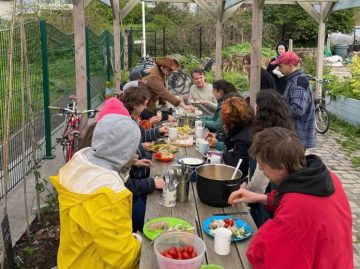The English Dispatch of The Centre for Sustainable Food Systems at UBC Farm
Alex Pomeroy first came to the UBC Farm as a practicum student in 2019, joining the field team in January 2020 as a field coordinator managing alliums, potatoes, cucurbits and legumes and spent one year with the chickens. He recently left the Farm and Canada for London, where his partner is pursuing her Master’s in Music Psychology. In these dispatches, Alex is sharing his impressions on the agricultural landscape in the UK, as he moves from field work to pursuing policy and community work in food.

Alex Pomeroy at an English pub.
From Skip to Plate
April 2023
Back in 2010 while living in Copenhagen, on exchange from UBC, my new friends and I established a weekly routine of midnight bike rides around the city, pulling food out of the bins behind supermarkets. Sometimes this involved scaling a fence, and although what we were doing wasn’t illegal, it felt exciting and a bit of a rush every time. The produce from all major supermarkets was wrapped in foam trays with cellophane wrapping, so for example if one tomato in the tray was bruised or damaged, the whole package would go into the bin. Every time we went out we would come back to my apartment, lay out the haul on the kitchen table (which once included an entire box full of bananas) and give everything a wash. Everyone in our little crew (Tomi, Lasse, Sam and my housemate Malthe and I) would have enough food to last until the next mission, and it really helped to offset the cost of living in a city like Copenhagen. It also helped me establish a more healthy lifestyle personally, and I began eating many new vegetables. I remember being very surprised by the level of food waste in such a socially and politically progressive place, and I saw the practice of dumpster diving as a truly radical act.

Summer 2010: A meal shared among friends made from vegetables pulled from the supermarket bins in Copenhagen
It is estimated that over ⅓ of food produced globally goes to waste. This is a tragedy on many levels, in terms of the resources used to grow, package and transport food, to the gross inequalities within our communities and around the world. The UK throws away close to 9.5 million tonnes of food a year, while nearly 8.5 million Britons are in food poverty. Food waste occurs at all levels, from suppliers ordering too much to sell, to poor education regarding best practices for storing produce once it’s in our homes (remember, keep your fresh herbs in a cup of water on the counter, just like flowers). When it comes to misshapen or unattractive produce (dubbed “wonky” in the UK), small steps are being taken to reduce waste. There is a box subscription called Oddbox which offers food otherwise destined for landfill at what seems to be reasonable prices. Sustainability does seem top of mind here in the UK which is promising, with similar startups addressing waste in other industries such as coffee and prepared food (eg. the Odd Coffee Company, Too Good to Go). Supermarkets offer “wonky” fruit and vegetables at reduced prices, and given the ongoing cost of living crisis, these seem like very popular options for many consumers.

Spring 2023: Earth Day meal with new friends at Glengall Community Garden, South London. Made with food pulled from the bins at New Covent Garden Market.
There is much to be done, however, when it comes to holding corporations accountable for food waste. As if it wasn’t bad enough to waste perfectly good food, it most often ends up in landfills, producing methane as it breaks down, accounting for up to 10% of the world’s greenhouse gas emissions. Would it be possible to require food suppliers to divert unused food to compost? This should clearly be a last resort, given the rise in food insecurity, with 4 million children in the UK (1 in 5 households) going without enough food. Free school meal programs do exist in the UK, but eligibility requirements exclude around 800,000 children, whose family income falls just above the established threshold. Could the government impose a tax or a levy on those corporations and businesses throwing out food? Would this be based on the amount of waste and if so, how would it be monitored? Perhaps these thoughts are too utopian in nature, but I truly believe that such changes are reflective of the world we must strive for.
When I moved to London back in December, I immediately started to think about ways in which I could not only feed myself and my partner more affordably, but also reduce our environmental footprints. Last week I pulled a perfectly good, in fact — made that day, baguette sandwich out of a bin bag on the sidewalk, one of many tossed out by shops daily all around London. I have been making new connections within the community, and have learned of various locations around the city from which to rescue produce. This past weekend on Earth Day, I volunteered at a nearby community garden and the day ended surrounded by new friends, sharing a meal made almost entirely from skip to plate.
Cheers,
Alex Pomeroy